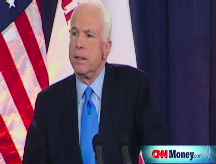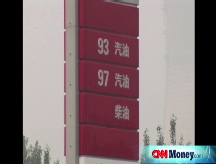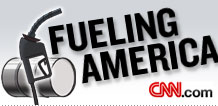Oil settles up in a volatile day
Traders weigh potential disruptions in Nigerian supply and Saudi's pledge to boost output. Stronger dollar also factors.
NEW YORK (CNNMoney.com) -- Oil settled higher on Monday after a day of volatile trading following a weekend meeting in Saudi Arabia that failed to yield concrete solutions to the world's energy problems.
U.S. crude for August delivery settled up $1.38 to $136.74 on the New York Mercantile Exchange.
Investors welcomed a decision by Saudi Arabia - the world's largest oil producer - to boost output. But many analysts say the move will not drive down oil prices any time soon.
Meanwhile, traders have been closely watching a tense situation in Nigeria that could potentially disrupt supply from Africa's largest oil producer.
Separately, the national average price for a gallon of regular gas fell overnight to $4.072, according to motorist group AAA. The national average diesel price fell from $4.778 a gallon to $4.772.
Saudi meeting: Saudi Arabia confirmed Sunday that the Kingdom will increase daily oil production to 9.7 million barrels from 9 million to blunt the sharp rise in international oil prices.
Saudi officials also said the government will invest in oil projects that will allow it to produce 12.5 million barrels per day by the end of next year.
The announcement came after a number of more modest increases that were largely overlooked by the market.
Several analysts said the oil market had already priced in the extra output.
Sunday's meeting "didn't tell the market anything it did not already know," oil industry analyst Stephen Schork said in his daily newsletter, The Schork Report.
But the ultimate outcome of the meeting could push oil prices higher, according to Schork.
"Bottom line, we fear that since the Saudis did not give this market a reason to sell, the market will interpret that as a reason to buy," he said.
Saudi Arabia and other members of the Organization of the Petroleum Exporting Countries have argued that there is no shortage of crude on the market. They say oil prices are being driven higher by speculative investment and a weakening U.S. dollar.
Oil consuming nations have responded that fundamental laws of supply and demand govern oil prices and that producers need to do more to keep up with growing demand from developing economies like China.
Nigeria concerns: Royal Dutch Shell (RDS.A) said Friday that it cannot meet contractual obligations to deliver oil from Nigeria following a militant attack last week.
Nigeria's main militant group announced Sunday that it would halt attacks starting at midnight Tuesday, according to the Associated Press.
The Movement for the Emancipation of the Niger Delta (MEND) declared a unilateral cease-fire, saying elders in the restive southern region had asked the fighters to allow peace efforts to go ahead, the AP reported.
Traders are also concerned about a possible labor strike at a Chevron (CVX, Fortune 500) facility in Nigeria.
A Nigerian white-collar union had reportedly decided to strike on Friday. But the union denied those reports Monday, according to the Associated Press.
The dispute hinges on demands the union has made over safety standards, staffing and the removal of the company's Nigerian head of operations.
Dollar gains: The dollar rose against the euro early Monday following dour economic reports in Germany and France.
"The dollar got the market off its earlier highs," said Phil Flynn, senior market analyst at Alaron Trading in Chicago.
A stronger dollar is seen as a sign that inflation will abate. That makes oil a less attractive investment for buyers looking for a hedge against inflation. And a more robust greenback makes oil and other dollar-denominated commodities less appealing to overseas investors. ![]()





